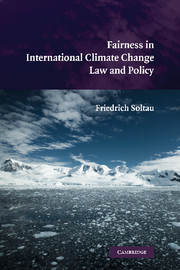Book contents
- Frontmatter
- Contents
- List of Abbreviations and Acronyms
- Acknowledgments
- 1 Fairness in International Climate Law and Policy
- 2 The Science of Climate Change and the Energy Challenge
- 3 Development of the International Climate Change Regime
- 4 Theoretical Aspects of Fairness
- 5 Fairness in the Climate Change Regime
- 6 Evaluation of Proposals for Future Climate Policy
- 7 Conclusion
- Bibliography
- Index
- References
5 - Fairness in the Climate Change Regime
Published online by Cambridge University Press: 24 December 2009
- Frontmatter
- Contents
- List of Abbreviations and Acronyms
- Acknowledgments
- 1 Fairness in International Climate Law and Policy
- 2 The Science of Climate Change and the Energy Challenge
- 3 Development of the International Climate Change Regime
- 4 Theoretical Aspects of Fairness
- 5 Fairness in the Climate Change Regime
- 6 Evaluation of Proposals for Future Climate Policy
- 7 Conclusion
- Bibliography
- Index
- References
Summary
INTRODUCTION
The preamble of the United Nations Framework Convention on Climate Change (UNFCCC) is striking for the prominence it gives to issues of fairness. It states, “Noting that the largest share of historical and current global emissions of greenhouse gases has originated in developed countries, that per capita emissions in developing countries are still relatively low and that the share of global emissions originating in developing countries will grow to meet their social and developmental needs.” Prominent reference is made to the principle of common but differentiated responsibilities. The special vulnerability to the impacts of climate change of low-lying, small island developing countries and other developing countries is recognized. It is also recognized that to achieve sustainable social and economic development, the energy consumption of developing countries will have to grow. Although the language of the preamble is aspirational, it forms part of the context in which the terms of the Convention can be interpreted.
Sovereign equality of states is the formal hallmark of international law. In reality, of course, states vary widely with respect to their military power, economic might, and strength of their institutions. Nonetheless, the ground rule is that states are bound as equals when international agreements are struck – weak or strong, poor or rich, parties assume undifferentiated obligations. The law of the climate change regime is an exception to this rule, providing the impetus for new norms intended to promote collective responses by states with widely diverging interests and capabilities.
- Type
- Chapter
- Information
- Fairness in International Climate Change Law and Policy , pp. 179 - 227Publisher: Cambridge University PressPrint publication year: 2009



